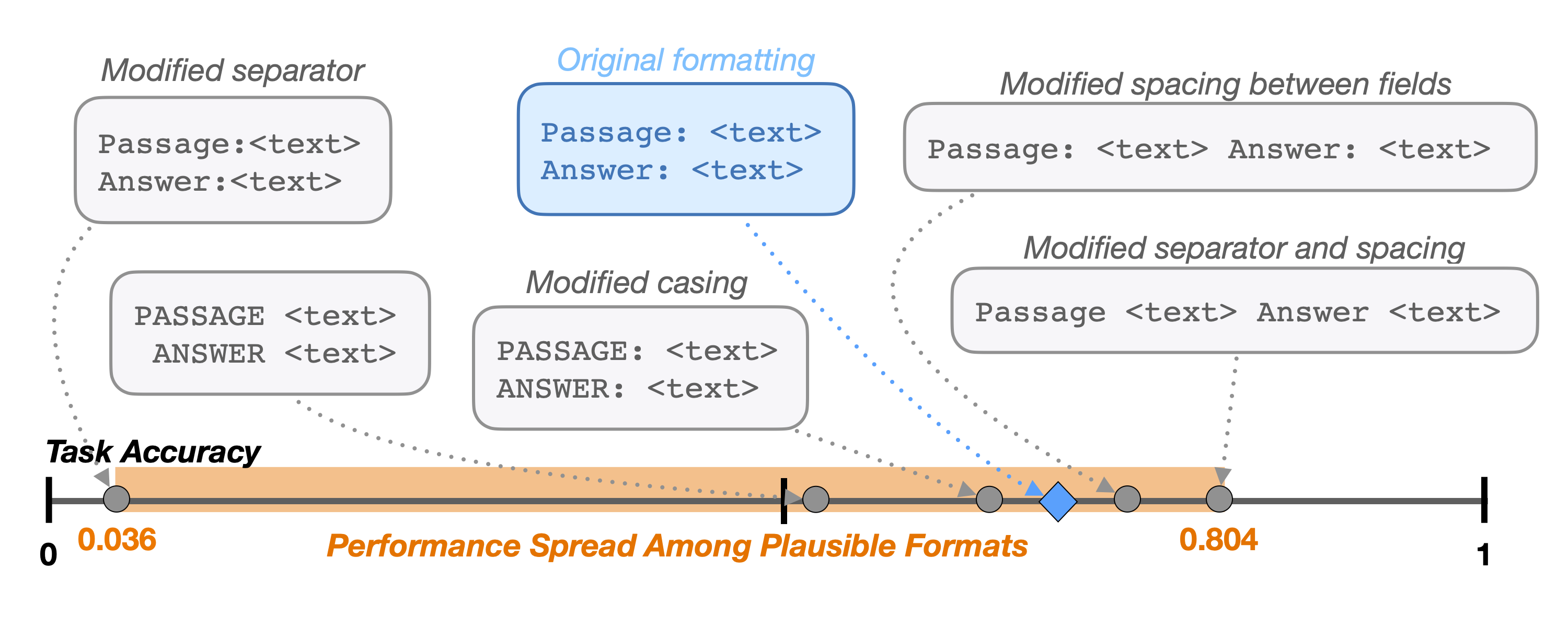Prerequisites: download natural-instructions and instruction-induction.
Dump of all package versions used is stored in pip_list.txt. Many packages may not be necessary to run this code.
main.py runs N+1 formats (N + original format) for a specific task. The formats are generated once and then reused for all future calls with the same --num_formats_to_analyze for a specific task, which ensures that all models are evaluated under the same set of formats. Evaluation (--evaluation_metric) may be done through string matching (exact_prefix_matching) or ranking between valid options (probability_ranking).
Example script for fully evaluating task158 from SuperNatural Instructions on 10 formats (9 + original) using 1-shot GPT3.5. The dataset will be reduced to 1000 samples:
python main.py \
--task_filename task158_ \
--dataset_name natural-instructions \
--num_formats_to_analyze 9 \
--batch_size_llm 2 \
--num_samples 1000 \
--model_name "gpt-3.5-turbo" \
--n_shot 1 \
--evaluation_metric exact_prefix_matching \
--evaluation_type full
Example command for evaluating 5-shot LLaMA-2-70B on task158 from SuperNaturalInstructions using bits and bytes (--use_4bit) to be able to run the model on a single A100. This command uses FormatSpread (with 320 formats, B=20, E=40000) and ranking multiple choice options as accuracy metric.
Setting --num_formats_to_analyze 499 ensures usage of the set of selected 500 formats as defined in data/holistic_random_sample_task158_nodes_499_textdisabled.json, which users may want to share with other runs.
python main.py \
--task_filename task158_ \
--dataset_name natural-instructions \
--num_formats_to_analyze 499 \
--batch_size_llm 2 \
--num_samples 1000 \
--model_name "meta-llama/Llama-2-70b-hf" \
--use_4bit \
--n_shot 5 \
--evaluation_metric probability_matching \
--evaluation_type format_spread \
--num_formats_format_spread 320 \
--batch_size_format_spread 20 \
--budget_format_spread 40000
Our scripts were generated to parse SuperNatural Instructions (--dataset_name natural-instructions) and Instruction Induction (--dataset_name instruction-induction) tasks.
If you want to run your own task, make the appropriate changes in data_loading.py using Instruction Induction as guidance. For reference of commonly used formats, refer to functions _one_text_field() and _two_text_field().
SuperNatural Instructions has some very complex formats that require using some extra params. We will add a tutorial (and simplify code) for them in the near future. Feel free to submit an issue if it is unclear to you how to should parse a specific format!
Modify _load_model() accordingly. Current load model function is extremely hacky :)
If you found the paper or datasets helpful, consider citing it:
@article{sclar2023quantifying,
title={Quantifying Language Models' Sensitivity to Spurious Features in Prompt Design or: How I learned to start worrying about prompt formatting},
author={Sclar, Melanie and Choi, Yejin and Tsvetkov, Yulia and Suhr, Alane},
journal={arXiv preprint arXiv:2310.11324},
year={2023}
}
